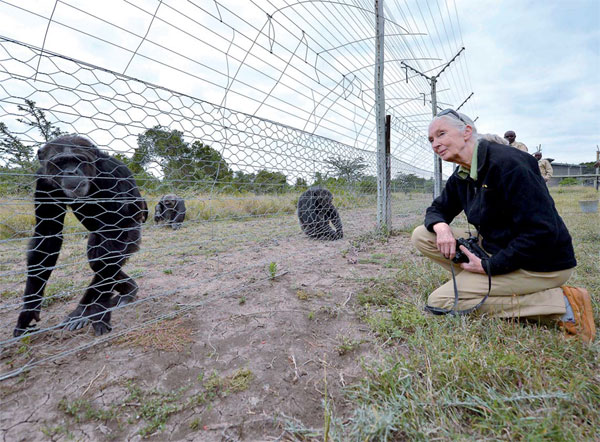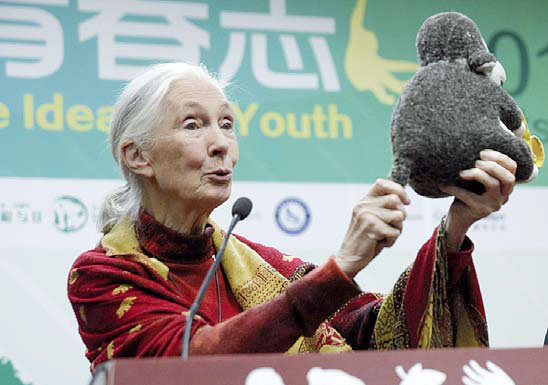Goodall: Our brains can save us

Champion of environment believes intelligence is humans' greatest asset in fighting threat of devastation
Bees can use tools. So can birds.
Octopuses can slither out of tanks, slink into others to gobble fish and squish back into their own, pulling the lid closed behind them - humans none the wiser, until they review surveillance footage.
Clever creatures. Indeed.
| Goodall looks at rescued chimpanzees in July at Sweetwaters, Kenya's only great-ape sanctuary. Photos Provided to China Daily |
| Primatologist and environmentalist Jane Goodall speaks at the recent Beijing summit of the Roots & Shoots environmental-education program for youth run by her institute. |
Especially considering that mollusks don't have brains, per se.
This, says Jane Goodall, the household-name primatologist who discovered that chimps use tools, makes it an amazing time for humanity's next generation to study animals.
And human intelligence can be the instrument by which we blunt ecological devastation, the Briton believes.
Goodall realized decades ago, upon observing the apes modifying natural objects to manipulate their environment - for instance, using sticks to extract insects from the earth - that we needed to "redefine man, redefine tool or include chimpanzees with humans".
So, science did.
"It was very exciting for me because I was the first to learn about chimpanzees," she says.
But revolutionary discoveries about animal intelligence are generating new paradigms.
"In 1960, if I said to the professors, 'Let's study the intelligence of the octopus', they would have laughed at me and locked me up as an insane person," she says.
"Now, there's huge interest because octopuses are incredibly intelligent, and they can solve problems. Crows ... can make tools. They can do things even some primates can't."
But experts for decades believed birds' dissimilar brain structures meant they weren't capable of intelligence, she points out.
"So, it's a very exciting time for young people to go out there and learn about animals."
Bumblebees were recently taught to pull strings to earn a reward. More strikingly, others replicated the procedure after observing it, she points out.
Goodall, who made the journey to Tanzania's forests as a young woman without formal training, is celebrated for revolutionizing our understanding of our species' closest kin. But her methods weren't without criticism, especially giving names rather than numbers.
Numbers "make them objects of study rather than living beings", she says. So, to me it's very, very important, if it's possible, to know them as individuals, to name them and describe them."
They may not be people, yet they have individual personalities. They share emotions like joy and sadness, she discovered. They're capable of empathy.
Goodall first documented chimp warfare.
"It's not only learning about the primate but also learning from the primate. There's a difference," she explains.
"It's more a humility. I have a lot to learn."
Goodall left the chimpanzees she loved decades ago - to save them.
She saw, while flying over Tanzania's Gombe in the early 1990s, that deforestation had shaved surrounding forests bald.
That changed everything.
She realized: "You cannot do animal conservation unless you do people conservation."
Protecting nature requires sustainable development that produces solutions for humans who share other species' habitats, she understood.
Goodall soon after led the successful movement to reforest the area and improve local residents' living standards.
But her battle is global.
The 82-year-old environmentalist, anthropologist and United Nations Messenger of Peace spends more than 300 days a year jetting around the world as an advocate.
What started as a mission to save the chimpanzees turned into a journey to improve life for all living things.
Roots & Shoots, an environmental-education program for youth run by the Jane Goodall Institute, has 150,000 members in 130 countries and regions, and 700 groups on the Chinese mainland.
"My hope for Roots & Shoots is to create a critical mass of young people who understand the importance of the natural world - for humans as well as wildlife - and a group of people who understand that, while we need money to live, it starts to go wrong when we live for money," she tells China Daily.
"But it's really young people who understand that economic development at the expense of the environment is a death knell, if it goes on like this, for the children of the future. That's worldwide."
Goodall says she has seen vast changes in Chinese children's mentality since she started coming to the country three decades ago. Adults are following suit.
"China is already beginning to do a lot. In some cases, it's a world leader in things like solar technology," Goodall says.
"The big problem in China is air pollution."
She says China has done better than many countries on climate change, especially regarding the Paris Agreement, which it signed.
But the world needs more, she believes.
"Some countries are really doing well. And other countries have signed it and are carrying on as usual or even worse - that's not China."
She's impressed by a water-purification system in Sichuan province's capital, Chengdu, that uses gravity to pull water through marshland plants that filter out contaminants. It doubles as a fish habitat.
Wetlands as sieves proved a prominent theme among students' displays at the Beijing Roots & Shoots summit. Six primary schools in Jiangsu province's Zhangjiagang distributed hand-drawn postcards of wetlands with handwritten descriptions of what they learned during field research.
Dalian Minzu University student Wang Shuaiyu called the event - and meeting Goodall - "very moving".
"It's a moment to celebrate all our environmental-protection projects," she says.
Goodall told the crowd one of her sources of hope is "our extraordinary brains".
"It's the explosive development of the human intellect that is the single greatest difference between us and chimpanzees, our closest animal relatives - and all other animals," she says.
Beijing's air pollution reminds her of London when she was growing up.
"It was the same in New York and Los Angeles. It was when people began to use their brains that we gradually made the difference."
That, she believes, is still happening worldwide.
"You," she told the Beijing crowd, "are my reason for hope."
Contact the writer at erik_nilsson@chinadaily.com.cn
(China Daily European Weekly 12/16/2016 page21)
Today's Top News
- Xi calls for promoting volunteer spirit to serve national rejuvenation
- Xi chairs CPC meeting to review report on central discipline inspection
- Reunification will only make Taiwan better
- Outline of Xi's thought on strengthening military published
- Targeted action plan to unleash consumption momentum
- Separatist plans of Lai slammed
































